As a relative newbie to the 18xx space, it’s been fun to hear from a variety of different people about the supposedly “best” way to introduce the system to new players.
18Chesapeake is one that comes up a lot. In my experience, 18Chesapeake fails at this mainly because the game’s opening draft and initial rounds of play are sometimes a bit stumbly and bankruptcy is fairly common. Worse, bidding on a private company that then doesn’t align with a specific strategy—which really gets painful when you realize that as a new player, you don’t have a specific strategy—can really put you in a hole.
1846: The Race for the Midwest is a game that I think works well as an introduction to the system, in part because it is friendly towards new players. Its main stumbling block for new players is the idea of “partial capitalization.” In this format (similar to 18xx-adjacent Euros like City of the Big Shoulders), investors can start a major corporation by plunking down 20% of the funds needed to “float” the company, as opposed to full capitalization.
Full capitalization is how the majority of 18xx games fund railroad companies. Usually, one player (or a variety of investors) finance 40-60% of a firm’s initial public offering to start operations. If a par is set at $70, a player needs to pay $420 ($70 x 6, since each share is worth 10% of the company’s worth) to the bank in order for XYZ Railroad to run trains. Then the company gets its entire 10-share capitalization value all at once. In XYZ’s case, that would be $700 ($70 x 10), and that would be all the cash it would get unless the president of that company withholds earnings or shares in the open market earn money for a corporation.
But after joining players on the site 18xx.games, I noticed that the site suggests three different games suitable for new players: 18Chesapeake (we disagree, per the above), Shikoku 1889 (a fantastic learning game, but long for new players), and 18MS: The Railroads Come to Mississippi. Based on this, I decided to give 18MS a try.
Now, after playing 18MS a number of times online and in person after purchasing a physical copy from the All Aboard Games web store, I know for sure which game is the best 18xx introduction out there.
In fact, it’s not even close.
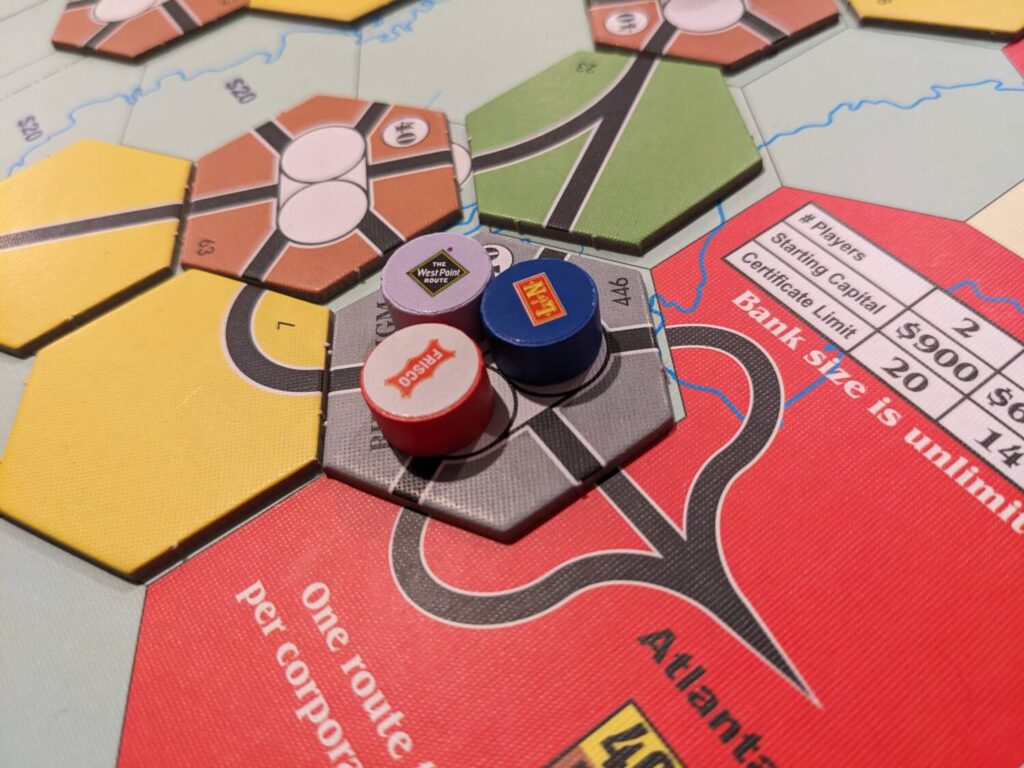
And, Your Money Back!!
18MS: The Railroads Come to Mississippi (2020, All Aboard Games) is a relatively new game in the 18xx world. Designed by Mark Derrick, a seasoned pro in the 18xx design space who also designed 18MEX and 18AL, 18MS is clearly designed to invite new players to try out an 18xx experience on a very tiny map that represents the American south in the mid-1800s.
In fact, 18MS was a part of the 18Dixie package from 2015, with the 18MS map serving as a “mini” 18xx game. In 2020, 18MS was marketed as a standalone product.
For a full breakdown of how games like 18MS work, please read my 18xx: A Beginner’s Journey introduction. I won’t do a full deep dive of the rules here, but I will call out many of the differences that 18MS offers.
18MS begins with a private company draft. As simplified as this process is in a game like 1846, 18MS takes it a step further. In reverse player order (from the priority deal marker holder), every player has to draft one single private company and pay its face value to the bank. No passing, no taking pass cards (yes, this is a thing in some 18xx experiences), no bidding, everyone takes one private and the others are discarded. It’s almost comical how much time this saves to start the game.
Like many Eurogame experiences, having a variable player power that can be used once per game gives the owner some sense of direction without being overwhelming. I’m surprised I haven’t seen a private draft this simple in any other 18xx game yet.
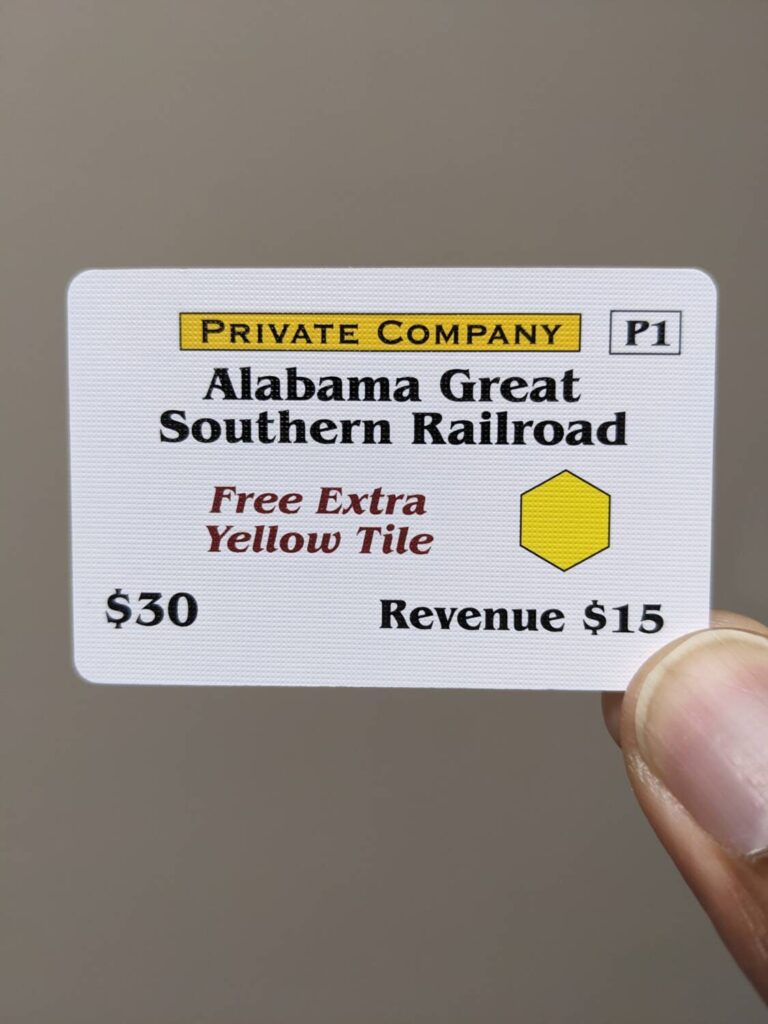
Players, serving once again as investors looking to make the most money to win, then proceed to the main action of the game. 18MS provides so many friendly, easy-to-parse guard rails, and that continues with the round structure. There are exactly five stock rounds. After each stock round, there are exactly two Operating Rounds (OR). After the tenth OR, the game is over (although a variant allows for an 11th OR, which I don’t recommend because a short game should just be short).
So, it’s easy to plan—you know when the game is going to end. And then, 18MS gives you what is maybe the best way for a new player to get a sense of the impending doom known as the “train rush” in other 18xx games: the train obsolescence is planned.
New players don’t have to worry that they will be squeezed by a surprise rush on better trains, killing off trains of the past. Nope! In 18MS, the 2+ trains rust after the fourth operating round (OR4), the 3+ trains rust after OR6, and the 4+ trains rust after OR8.
This provides a gentle push from the game’s systems to do the things you will have to do in any 18xx game, but in a way that’s predictable. That way, no one gets hosed too badly when players realize that they are about to lose a train or two at the end of an upcoming OR. (Like some other 18xx games, towns—the small dots or dashes that represent smaller locations on the map—can be added to the revenue for a train. The 2+ means two cities, PLUS any number of town locations on a route.)
Oh, and to add kindness to kindness: when your trains do rust, you get a small amount of compensation for the trains that rusted out of play. 18MS is the only 18xx game I have played that actually gives you a little cash back for your trouble. “Oh, you just lost your two 3+ trains? Here’s a total of $60 for your trouble.”
WHAT???
Experienced 18xx players used to grinding it out in a 10-hour game of 1817 will raise their nose at some of these rules. But, that’s the point: 18MS seems firmly entrenched in the “this game is for rookies” mindset, and I love that. It’s so friendly it will make you wonder if there are drugs in the brownies that your neighbor just brought to your door. It’s so friendly that you’ll immediately suspect the game of trying to pull a fast one. It’s so friendly that you’ll wonder why more games don’t try to be this nice.
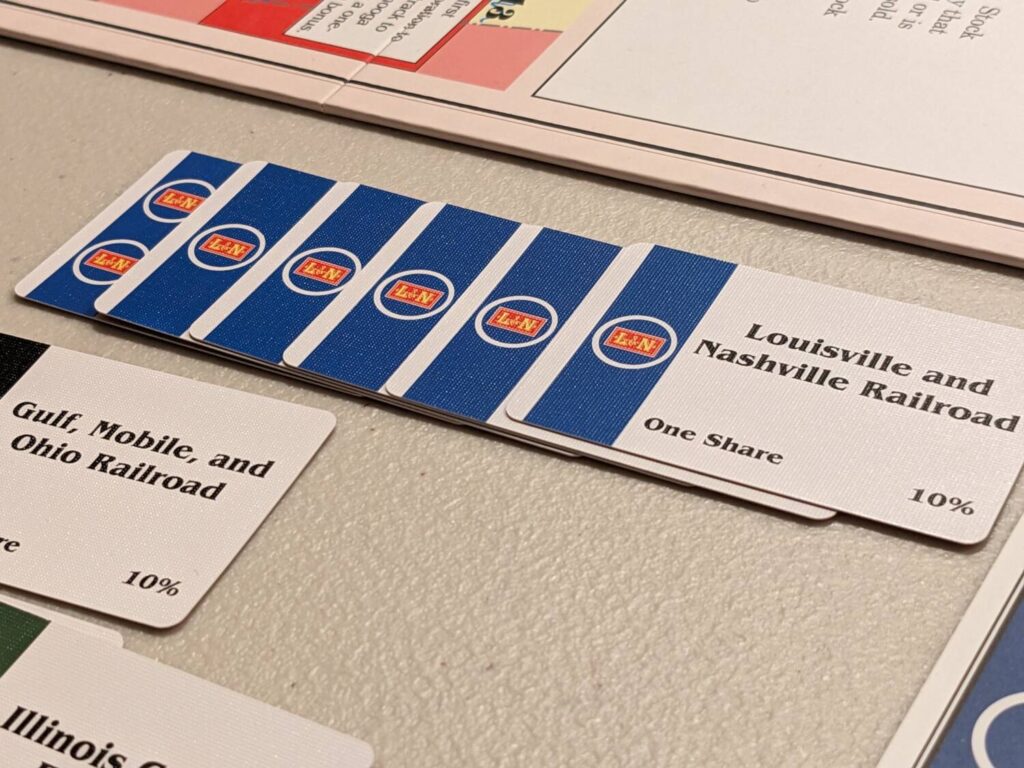
The Map
18MS continues its joy parade by only allowing 2-4 players to sit at the table. With a map this small, a four-player maximum feels perfect for the small amount of chaos it creates. (I have not tried 18MS at two players, but I don’t plan to, either. Most 18xx games work for me at larger counts.)
A pool of the same five major companies is available in every game. The first thing I noticed about the map was how distinctly away from each other three of the entities seem to be. Gulf, Mobile, and Ohio (GMO), Illinois Central (IC), and Frisco basically have their own areas to work in, between the south, north and western sides of the map, respectively.
Western Railway of Alabama (WRA) and Louisville & Nashville (L&N) have a more territorial situation, even early in the game. That’s because L&N has the inside track to the Chattanooga off-board location in the northeast corner of the map, which pays a one-time $50 bonus to the first railroad line that runs a route there. WRA has an enviable position in the center-eastern portion of the map and easy ways to connect everywhere else, but often requires help to connect to the best late-game payouts.
Frisco and GMO are usually fighting for the New Orleans bonus. Located in the southwestern corner, New Orleans awards a $100 bonus to the first railroad to place a token on that off-board (red areas on the sides and corners of the map) location. In addition, that token holder gets a $10 bonus for every route they run through New Orleans for most of the game.
Depending on the private companies that were drafted, the owner of Frisco or GMO often uses their private’s special power to quickly connect to New Orleans to snatch that $100 bonus.
It’s a tight map. And on the first turn with a new railroad, a player can lay two pieces of yellow tile track instead of the normal one tile, so it’s a map that develops quickly and then spends most of the remaining ORs being upgraded by players to open other connections.
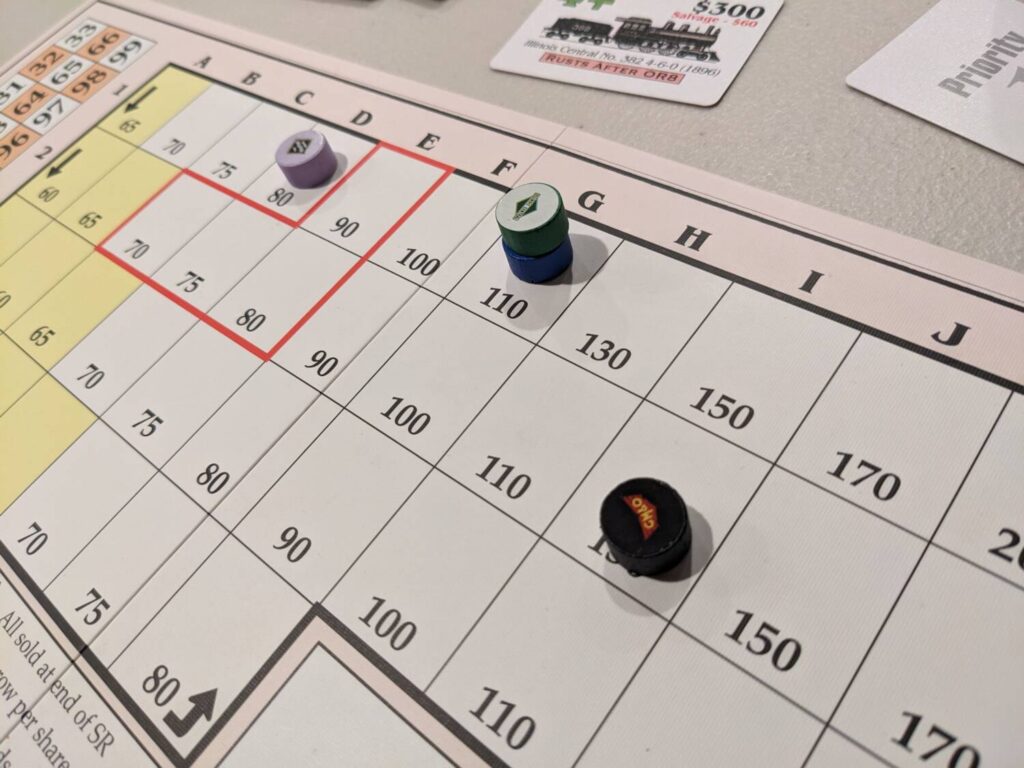
Wait, My Money, Too?
Remember that bit about how 18MS is so friendly to new players? Well, what if I told you that in addition to all the other ways it invites new players into your home, you get to mix your money between railroad/charter/company money and personal/investor funds?
Yes, in 18MS, when you are interested in buying a new train but your corporation doesn’t have quite enough money to pick up the tab, you can sprinkle a little personal cash into the proceedings. You can’t do that in any other 18xx game that I have heard of (forget played; HEARD OF) unless we are talking about an emergency train purchase.
Let’s say you are operating GMO, and there is $400 in its company treasury. We are on the permanent 6 trains, which cost $550. No problem. Thanks to the Presidential Contributions for Permanent Trains initiative (rule 11.8.2), you can spend all the $400 company treasury then add $200 of your own money to complete the purchase: $150 for the overage to get the 6 train, and a small $50 additional fee. You can do this even if you do not need a train.
You are never out of a game of 18MS, my friends!.
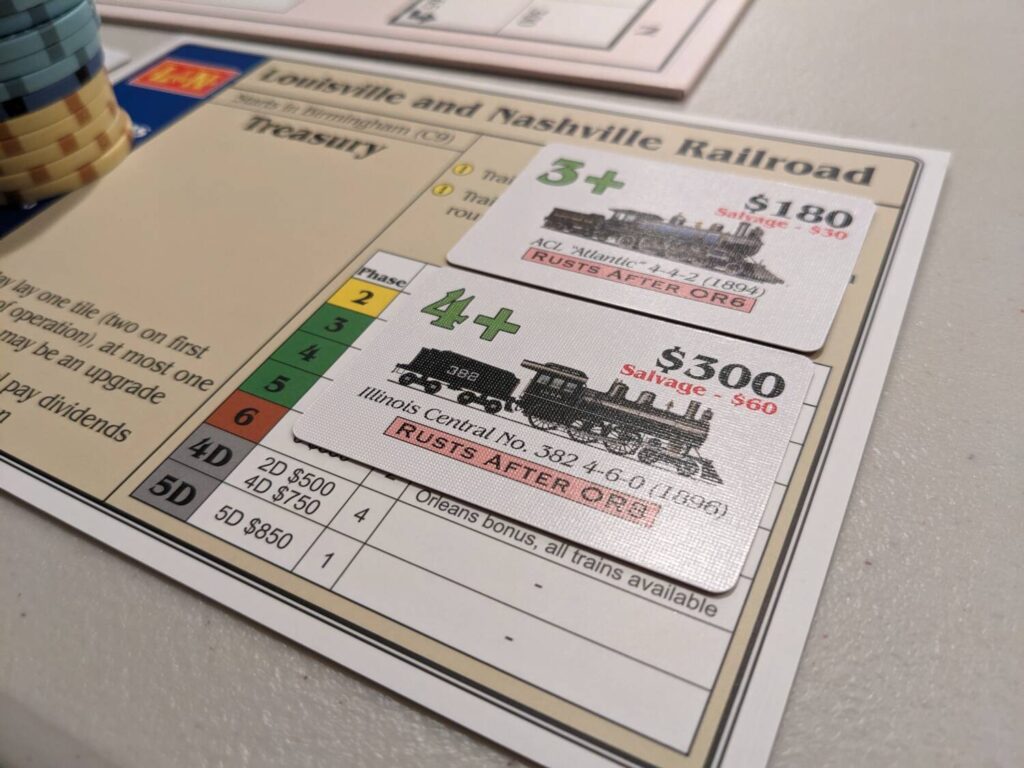
The Best and Worst Thing About 18MS
Without a doubt, 18MS is the friendliest 18xx game I have tried. The round structure is predictable, you get a handout when your trains rust, the map is tiny, the private draft is simple, and you can even mix funds to buy a permanent train to ensure that your start-up train operation continues to run smoothly.
It even plays in a friendly timeframe. The box says 18MS can be played in about two hours, and with four brand-new-to-18xx players at the table, you should be able to knock this out in three hours. I recently did an in-person play with three players—me (relatively experienced), a guy who had played two 18xx games online, and a total rookie. We knocked out a full game in just under two hours. That’s unheard of for a game system legendary for epic playtimes, but that’s why 18MS is an option even on a weeknight.
Here’s the rub: 18MS is a limited experience. 18MS is best used as a way to convince people that 18xx games are worth a look, and after 12 plays of 18MS (mostly online, a little in-person), I’m only keeping my copy of the game to teach new players how to embrace the system. It doesn’t have the depth of 1846, 1830: Railways and Robber Barons, 1882, 18Chesapeake, Shikoku 1889, or any other 18xx early-career experience I’ve seen.
One other way I might use this in the future is to close out a long day of train games. During my recent visit to TraXX, I watched three players wrap a game of 18MS in under 90 minutes. Sure, these were seasoned train gamers, but it’s great to know that a game can finish so quickly.
There is one minor issue with starting players off in 18MS. Many of the rules are so friendly, you’ll have to warn your playgroup that most 18xx games aren’t nearly this inviting. While certain items such as the selling of shares to lower a company’s stock price hold consistent between other 18xx games, many of the tweaks in 18MS do not appear in other 18xx games.
Don’t get too comfortable with the idea that you can mix your funds to buy a train in any other game. Trains rusting on a schedule? Not happening anywhere else, either. Some of this will tempt players into trying something much heavier too quickly, only to get punched in the nose when those players realize that everyone has bought the same midrange train in the turn after you decided to pay out instead of withholding, hosing your chances at getting a reasonably-priced train in a future round.
So, there’s that. 18MS is a great way to learn the how, and even a bit about the why. 18MS serves as a solid dressing for a longer look at other 18xx games, as long as everyone is honest about the caveats of what the system holds for more cutthroat experiences down the road.



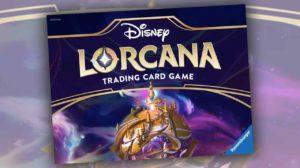







Add Comment